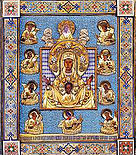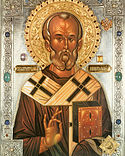A Comparison of the Ecclesiologies of the ROCA and Metropolitan Cyprian
The Ecclesiology of the Church Abroad.
Although the Church Abroad has not issued conciliar determinations on the presence or absence of Grace in the churches of “World Orthodoxy,” we can say that the views of Prof. I. Andreyevskiy have been a guideline to which many have subscribed. In his work, “Does the Soviet Church have Grace?”, he offered the following:
- “the falling away of a church from God…is a process.”
- “the Soviet Church has embarked on a path which leads to its transformation from a church of Christ to a ‘satanic assembly’.”
- “we have no communion with the Soviet Church because we doubt it possesses Grace.”
Accordingly, the ecclesiology of the ROCA in regard to World Orthodoxy can be formulated as follows:
- The churches of World Orthodoxy are on a path of apostasy, which inevitably will lead them to falling away from the Church – the body of Christ. We have no communion with the churches of World Orthodoxy because we do not wish to participate in their apostasy.
- The falling away from the Church of such a large structure as World Orthodoxy is a process that cannot be completed instantly. It doesn’t occur everywhere at the same pace: faster in some instances, slower in others.
- To what extent this process has already concluded is known only to God. The question of whether Grace is present or absent in the churches of World Orthodoxy resides at the level of personal opinion, not in the realm of the Church’s compulsory teachings.
For example, St. Philaret of New York was convinced that this process had concluded and that the Moscow Patriarchate’s sacraments did not have Grace, but he always added that this was his personal opinion. Other bishops disagreed with him. Although the ROCA bishops had differing opinions on this subject they still belonged to one Council of Bishops and did not accuse each other of not being Orthodox.
The Ecclesiology of Metropolitan Cyprian
The ecclesiology of Metropolitan Cyprian (Kutsumbas) arose as a reaction to the position taken by other Greek True Orthodox synods proclaiming that the New Calendar Greek Church did not have Grace. Met. Cyprian did not agree with this opinion and considered it to be extreme. Met. Cyprian maintained the opposite, that the sacraments of the New Calendarists-Ecumenists were valid and had Grace. To support his view, he developed a concept that he explained in his work, “Ecclesiological Theses.”
According to Met. Cyprian, the Church is presently divided into two parts: Orthodox and heretical. The sacraments of both have Grace. Heretic ecumenists will remain in the Church until ecumenism is condemned by a Council. However, councils of the Orthodox who are opponents of ecumenism, are not competent to pass judgment on the heresy of ecumenism. For a final judgment on the heresy of ecumenism, both parts of the Church, the Orthodox and the ecumenical, must gather in a unification Council. This Council will proclaim anathema against ecumenism and will again unite the divided Church.
One need not possess great theological knowledge to see that this concept is not Orthodox.
We believe in the one, holy, catholic and apostolic Church. The Church cannot possibly be divided into parts with differing beliefs. This would contradict the oneness of the Church. Also, Met. Cyprian’s opinion that a heretical group can remain a part of the Church, for practically an unlimited time, contradicts the dogma of the holiness of the Church. In accordance with the teachings of the Holy Fathers, the Grace of the sacraments exists only in the Church, while heretical communities do not belong in the Church and therefore their sacraments cannot have Grace.
Without going any further, the differences between the ecclesiology of Met. Cyprian and of the ROCA are immediately apparent. The ROCA bishops anathematized ecumenism in 1983, but applying the principle of oikonomia, did not rush to openly condemn all the hierarchies of World Orthodoxy as heretical, in the hope that they might return to the fold.
Met. Cyprian, on the other hand, directly calls the hierarchs of World Orthodoxy heretics, while at the same time asserting that they, as heretics, remain a part of the Church. Furthermore, he bases his opinion on the writings of the Holy Fathers, and in this fashion presents it as a teaching of the Church, required of all of us.
The ROCA bishops did not issue a conciliar judgment on the Grace of the sacraments of the churches of World Orthodoxy, leaving this as a matter of personal opinion. Met. Cyprian, however, does make such a judgment and even insists that his opinion is the only correct one.
If the position of the ROCA bishops is oikonomia, then the teachings of Met. Cyprian are undoubtedly a heresy.
However, it is not necessary to extend this point to the conclusion that Met. Cyprian himself was a heretic. As we know, mistaken beliefs were even held by some Orthodox saints. Met. Cyprian’s teachings were created as an antithesis to the black-and-white “ultra-correct” formalism that is just as foreign to the spirit of Orthodoxy.
The ecclesiology of Met. Cyprian was an attempt to theologically conceptualize the current, historically unprecedented, state of the Church. However, this attempt cannot be considered successful. In Met. Cyprian’s defense, it should be said that to this day this question has not received an unambiguous conciliar, theological determination.
We must adhere to the traditional position of the Church Abroad, not accepting the unorthodox opinions of Met. Cyprian, but also not descending into the pharisaical formalism of false “zealotry.”
Bishop Andrei

